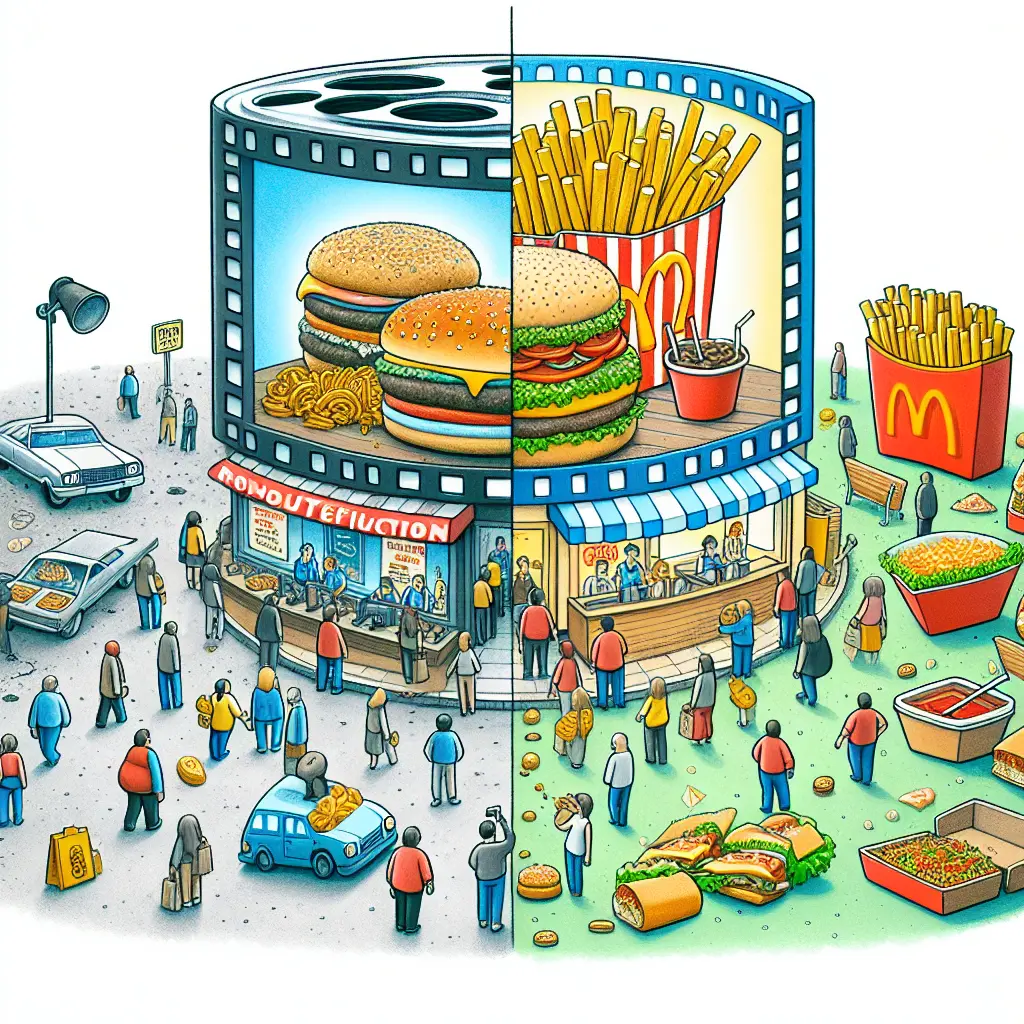In 2004, the release of the "Super Size Me" documentary sent shockwaves through the fast food industry, sparking a global conversation about fast food nutrition awareness and the impact of fast food health on public well-being. Directed by Morgan Spurlock, this educational documentary provided a gripping case study of his month-long experiment of eating only McDonald's food, shedding light on the alarming consequences such diets could have. As one of the most influential documentaries on food, "Super Size Me" not only entertained but also educated millions, marking a pivotal moment in health documentaries that changed the world.
The impact of "Super Size Me" was immediate and profound. It spurred fast food industry changes as companies scrambled to reformulate their menus and adopt healthier practices, leading to significant changes in fast food marketing strategies. The documentary's influence even extended to legislative discussions around nutritional transparency and fast food industry practices. For those analyzing documentaries that changed the world, "Super Size Me" stands out as a prime example of how media can drive public discourse and policy changes, becoming a cornerstone in the realm of fast food documentary impact.
The lessons from "Super Size Me" continue to resonate, reminding us of the power of documentaries in shaping public health perceptions and prompting industry reform. As we delve deeper into this exploration of its legacy, we unravel how Morgan Spurlock’s influence pushed fast food health awareness to the forefront, changing how consumers and corporations view nutrition. This analysis leads us to examine the broader implications and ongoing reforms within the fast food sector.
Fast Food Industry Changes: A Response to Consumer Awareness
The "Super Size Me" documentary served as a wake-up call, prompting fast food chains to reevaluate their offerings. As Morgan Spurlock vividly demonstrated the health risks associated with fast food diets, consumers became more aware of nutritional information, leading to a demand for healthier options. This consumer-driven push resulted in:
Many fast food companies began reformulating their menus to include healthier options. For instance, McDonald's introduced salads, fruit options, and removed super-sized items from their menus shortly after the documentary's release. This shift was partly in response to the growing fast food health awareness generated by the film.
The Influence of "Super Size Me" on Fast Food Industry Practices
In the wake of the "Super Size Me" documentary, the fast food industry faced an unprecedented wave of scrutiny and pressure to implement significant changes. This pivotal moment in the history of educational documentaries not only affected consumer perceptions but also had a profound impact on fast food industry practices. Let's explore how this documentary reshaped an entire sector and continues to influence it today.
The documentary's influence extended to demands for greater transparency in nutritional information. Fast food chains started displaying calorie counts on menus, which later became a legislative requirement in many regions. A study published by the National Institutes of Health found that calorie labeling can lead to a moderate reduction in caloric intake by consumers.
Changes in Fast Food Marketing: Adapting to New Norms
One of the significant outcomes of the "Super Size Me" educational impact was how it forced changes in fast food marketing strategies. The emphasis shifted from promoting indulgence to highlighting health-conscious choices. Companies invested in marketing campaigns that underscored their commitment to offering balanced meals.
Fast food advertisements began featuring fresh ingredients and showcasing healthier meal options, an approach that was relatively rare before the documentary's release.
Morgan Spurlock's Influence: Pioneering Fast Food Reform Documentaries
Morgan Spurlock’s "Super Size Me" remains a cornerstone in the genre of fast food reform documentaries. The film's unique approach—using a personal case study to highlight broader public health issues—set a precedent for future documentaries. Filmmakers continue to explore similar themes, using compelling narratives to spark conversations around dietary practices and industry accountability.
The impact of "Super Size Me" has been evident in subsequent documentaries, such as "Fed Up" and "Food, Inc.," which delve deeper into issues of processed foods and corporate responsibility. These films continue to contribute to public discourse and encourage legislative changes.
Fast Food Nutrition Awareness: Ongoing Challenges and Developments
Despite progress, the fast food industry still grapples with challenges related to nutrition and public perception. Recent articles highlight several ongoing efforts and challenges:
In response to rising concerns over meat consumption's environmental and health impacts, many fast food chains have introduced plant-based menu items. Brands like Burger King have partnered with companies like Impossible Foods to offer meatless burgers, appealing to health-conscious and environmentally aware consumers (Reuters).
Super Size Me Lessons: Public Health Implications
The lessons from "Super Size Me" extend beyond individual dietary choices, touching on broader public health implications. As consumers become more informed about the impact of diet on health, there's a growing demand for systemic changes:
The documentary spurred discussions around policies that promote better nutrition education and regulate food marketing to children. In recent years, there have been calls for stricter advertising guidelines to protect vulnerable populations (World Health Organization).
Public health organizations have launched educational campaigns aimed at increasing awareness about the risks of high-calorie diets and encouraging healthier eating habits among all age groups.
Super Size Me Case Study: An Ongoing Conversation
The "Super Size Me" case study continues to be referenced in discussions about media influence on public health. Its enduring impact is seen in both consumer behavior shifts and corporate strategies. While the fast food industry has made strides toward improving its practices, the conversation initiated by Morgan Spurlock remains relevant as new challenges and trends emerge.
By examining the legacy of "Super Size Me," we gain insight into the power of documentaries that changed the world and their role in shaping societal values. As consumers and companies alike navigate an evolving landscape, the documentary serves as both a cautionary tale and an inspiration for ongoing reform.
In exploring these themes, we see that "Super Size Me" is not just a film but a catalyst for change—a vivid reminder of how media can drive meaningful conversations around public health and industry accountability.
In conclusion, "Super Size Me" has left an indelible mark on the fast food industry and public perception of nutrition. The documentary catalyzed significant changes, prompting fast food chains to adapt to an increasingly health-conscious consumer base.
Key transformations include:
- Menu Reformulations: Fast food companies have introduced healthier options and reduced portion sizes, responding directly to consumer demand sparked by the documentary.
- Nutritional Transparency: The push for clear calorie labeling on menus has become widespread, empowering consumers to make informed dietary choices.
- Marketing Shifts: The industry has embraced health-centric advertising and brand repositioning, aligning with the growing emphasis on balanced lifestyles.
Morgan Spurlock's pioneering work has inspired subsequent documentaries that continue to challenge industry norms and advocate for corporate accountability. Despite progress, the fast food sector still faces challenges, such as incorporating plant-based alternatives and addressing public health implications through legislative advocacy and educational campaigns.
"Super Size Me" serves as a powerful reminder of media's ability to influence societal values and drive meaningful change. As consumers become increasingly aware of diet's impact on health, the conversation around fast food practices remains relevant.







Leave a Comment